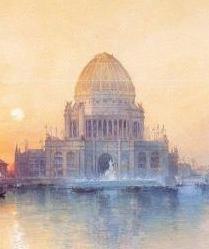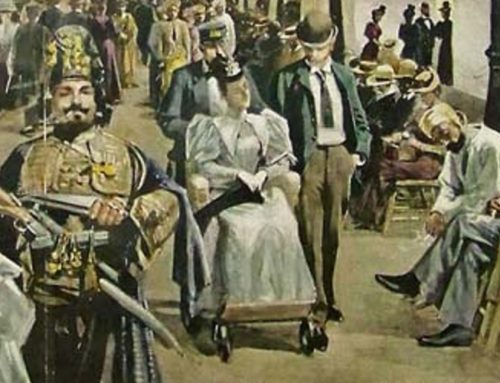After serving four terms as mayor of Chicago from 1879 to 1887, Carter Harrison, Sr. ran again in 1893 to become the “World’s Fair Mayor.” He oversaw the city’s hosting of the World’s Columbian Exposition until the fateful evening that he was assassinated, just days before the scheduled closing of the Fair.
Shortly after the mayor’s death, The Review of Reviews (December 1893, p. 663) published this article, which included a letter written to the journal by the mayor nearly a year earlier, on January 16, 1893. The mayor’s missive, characterized by “audacity, buoyancy, naivete and egotism in every line,” outlines his vision for Chicago in the year she would host the world.

______________________________________________________________________
“III. Carter Harrison of Chicago”
A Greek tragedian’s demand for fateful climax, or a Roman Emperor’s taste for thrilling sensation amid spectacular surroundings, must have been fully satisfied by the circumstances under which the Mayor of Chicago was assassinated at the close of the World’s Fair. For more than twenty years Carter Harrison had been a conspicuous personality, and for most of that time he had been constantly recognized as the one man who could lead and command the heterogeneous masses of Chicago’s working population. Again and again he had been consigned to oblivion by the educated, prosperous and morally earnest classes of the community regardless of party or sect; and at the very times when his complete suppression seemed most inevitable, he rose most triumphantly on the shoulders of overwhelming masses of the common people.
His last triumph was the greatest of all. The “responsible” men of Chicago were determined to place in the Mayor’s chair for the period including the six months of the Columbian Exposition a man representing their own ideals of citizenship and public life. They regarded Carter Harrison as the arch representative of all those dangerous and lawless elements whose reinforced presence in Chicago during the Fair was naturally regarded with serious apprehension. Early in the spring of the present year these “better classes”—to use an accepted phrase—were confident that the vast Chicago leviathan was in a serious and responsible mood and could be relied upon not to commit the dangerous levity of placing the city for the fifth time under the rule of the man so generally regarded as a flippant and conscienceless demagogue. But for the fact that Carter Harrison had recently acquired the proprietary control and assumed the nominal editorship of the Chicago Times, there would not have been a single newspaper of importance in the entire city to support his aspirations.
His first step was boldly to enter the Democratic convention and claim the nomination from a party whose candidate he had opposed in the preceding mayoralty contest, and whose defeat he had secured by the division of forces consequent upon his canvass as independent candidate. After a hot struggle lasting several hours, which he calmly surveyed from his seat on the platform, his cause was won and he was declared the regular Democratic nominee. Excepting his own paper, the leading Democratic journals refused to indorse the result, and gave their support to Mr. Allerton, the Republican candidate, a gentleman of high standing who was selected on the score of eminent fitness for the place. The supporters of Allerton were very confident; but Carter Harrison surprised them on election day. The people accorded him the great honor of serving as World’s Fair Mayor by a majority of more than 20,000.
There was a sort of consistency in this fidelity to Carter Harrison that the country could hardly help admiring, even though condemning the means by which he had built up and maintained his ascendency. After all, Chicago seemed only true to itself in exhibiting to the world as its Mayor the man whom it had so often preferred when the world was not expected and its opinions were not considered. How Mr. Harrison himself viewed the situation in advance, before he had publicly announced himself as a candidate for the Mayoralty, is very interestingly shown in the following letter written by him to the editor of this magazine:
Chicago, January 16, 1893.
Dear Sir:
I cannot say what the condition of Chicago win be as to “cleanliness, good police service, and general municipal efficiency during the World’s Fair.” All or much will depend upon who will be at the city’s head after the April election. The cleanliness will depend: 1, Upon the appropriation made by the present administration for that purpose, but as there is a general demand that it be sufficient, I hope it will be so made, and 2, upon the Mayor who will expend the money. The police force is a large and splendid body of men. A good Mayor and chief of police can make it very efficient. I hope the people will have sense enough to elect the Mayor, and he will be able to appoint the proper chief. The electric lighting is only partially extended, and seems so far to have proved the wisdom of the experiment. The water supply will be ample and good. I have no fear of a violent epidemic of cholera, should the scourge reach us. Our almost constant winds and the lake will cause it, if here, to be mild. But we hope to escape it.
There is a firm determination among our people that the city will be able to wear a gala dress in which to receive the world. We are naturally given to advertising ourselves, and will not forego the opportunity of a good send-off in the eyes of our great visitation. We think ourselves the salt of the earth and our city the proper location for such salt. We are determined to force the world to concede both propositions.
We will hardly make fools of ourselves at so important a juncture by placing at the head of our affairs an inefficient man. But the world has proved that the exclamation is quite natural—”what fools these mortals be!” It is barely possible we may not prove ourselves an exception. Our city is not in first-class condition financially. Our organic law does not permit us to borrow a cent. To meet ordinary and extraordinary expenditures we must look only to the current tax levy. Judicious handling of the proceeds of this levy, therefore, is absolutely imperative. A partisan press (and mercenary newspaper owners) which prefers a willing tool for its benefit may cause the people to throw away their opportunities. In fine, our people are resolved to put and maintain the city in proper condition to receive the world, and I believe they will not make their resolutions vain.
Very respectfully, etc.,
Carter H Harrison.
Even those readers not at all familiar with Mr. Harrison’s utterances can detect many of his traits in this eminently characteristic letter; while to those of us who have observed his career for many years it has the Harrisonian qualities of audacity, buoyancy, naivete and egotism in every line





Leave A Comment